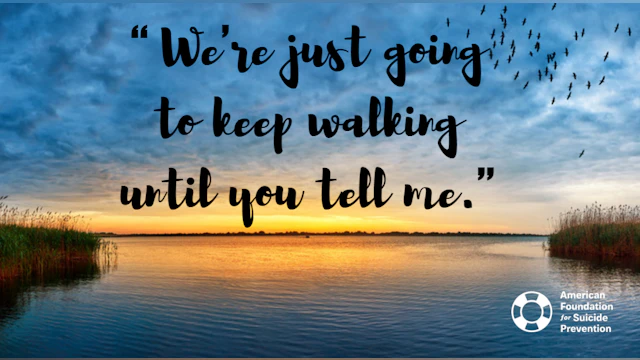This year, AFSP is urging people to reach out and have a #RealConvo with someone. Click here to submit your own #RealConvo story.
January 12, 2018 - I remember walking around the East Village with an old college friend a couple of months after my mother died by suicide. Bronwen and I had become particularly great friends after we’d graduated, and both lived in New York City. She’d recently moved upstate with her husband and precocious three year-old. She knew my mom had died. I just hadn’t told her how, yet.
I was pretty sure she had her suspicions. Bronwen knew my mom had severe problems with depression, and had threatened and attempted to kill herself in the past. But it never felt like the right moment to tell her whenever I’d been on the phone with her the last couple of months. I had told other people. It had nothing to do with whom I felt closest to; it was simply a matter of whether I felt up to it or not, at whatever moment I happened to be speaking to them.
Bronwen came in to the city and hung out with me once a month or so. This particular night, we had walked around, gotten dinner, and walked around some more. She missed living in the East Village. I knew she had to get to the subway soon, to catch whatever train she needed to take her back home.
Still, we kept walking. And I kept not bringing it up. The conversation would lull. I found myself making small talk.
“You know,” she finally said, “we’re just going to keep walking until you tell me.”
It’s important to tell people your loved one died by suicide, if you feel able. If someone you loved died from cancer, you’d tell people that. The more open we are about mental health, the greater the chances those who are struggling will feel comfortable reaching out for help. Letting people know about your loss encourages others who’ve lost someone to suicide to open up as well. We all deserve the support.
And yet…it’s hard. As someone who’s been through it and healed, here’s a practical, somewhat lighthearted list of options for how to tell people your loved one died by suicide:
With a buddy next to you for support
You’ve heard of the concept of a “wingman.” Well, if you’re feeling particularly raw, it may not be a bad idea to get yourself a suicide loss wing-person – a relative, or a good friend you feel comfortable with – to sit next to you while you tell other people. They can be on tissue duty, pat your knee, peel you a grape…anything that makes you feel more comfortable while addressing a difficult subject.
In a group of friends
Why go through the conversation numerous times, especially if it’s hard, when you can meet up with your group of friends all at once? This is how Samantha would have done it on Sex and the City. Or Eric on Entourage. Or Archie on Riverdale. It doesn’t even need to be a close-knit group of buddies: all that matters is that they’re people who care about you. Some folks are better than others at knowing what to say in response to a suicide death. Chances are, in a group of people, at least one of them will take the lead.
Over ice cream, or doing something fun
Yes, you have to let your friends in on some extremely sad news. That doesn’t mean – especially if some time has gone by – that you have to do it while eating a wilted salad, listening to a funeral march, or outside in the rain. Have the conversation at an ice cream parlor. Or get a bite to eat before heading to a ball game. Offset the obvious sadness by placing yourself within circumstances you find comforting. And don’t feel guilty about it.
Not in person
It may not feel right to tell someone about a suicide death over email – and you absolutely shouldn’t deliver the news this way to someone who closely knew the deceased – but sometimes in the wake of a suicide death, the act of opening your mouth and telling someone in person can feel like more than you can bear. If the idea of letting a close friend of yours know what’s going on electronically seems easier to you – and it’s not someone who closely knew the deceased – type away.
Have someone else do it
Finally, if you’re having a really hard time saying or even writing the words – which is understandable, since losing someone to suicide is incredibly traumatic – see if someone close to you who you’ve already told would be willing to break the news to others first, before you talk to them. Knowing that the person you need to talk to already knows the basics can take some of the pressure off.
The point is, it doesn’t really matter how you tell people about your suicide loss. It’s all about your own personal comfort zone. Your good friends just want to know what’s going on so they can be there for you.
Some of them might even be willing to miss their train.
